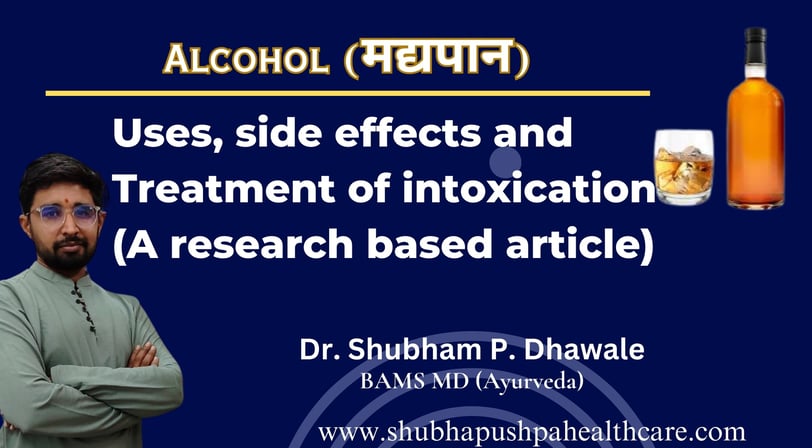ALCOHOL (मद्यपान): Uses, Side Effects & Treatment of Intoxication
Explore the Ayurvedic perspective on alcohol consumption—its uses, harmful effects, and natural detox solutions. Learn how excessive alcohol disrupts physical, mental, and social well-being, and discover Ayurvedic herbs, Panchakarma therapies, and lifestyle changes for recovery. Understand the connection between Holi, Bhang, and alcohol, along with safer Ayurvedic alternatives. Read the full article to gain expert insights from Dr. Shubham P. Dhawale (BAMS, MD Ayurveda) on achieving a balanced, addiction-free life. Read More: Shubhapushpa Healthcare™
Dr. Shubham P. Dhawale (BAMS, MD Ayurveda) Co-founder of Shubhapushpa Healthcare™
3/18/20253 min read


Introduction
Alcohol consumption, commonly referred to as Madyapana in Ayurveda, has been a part of human culture for centuries. While it is used socially and ritually, excessive consumption leads to severe physical, mental, and social consequences. In Ayurveda, alcohol is classified based on its source, fermentation process, and its impact on the three Doshas—Vata, Pitta, and Kapha.
With Holi around the corner, discussions about Bhang (Cannabis) and alcohol consumption naturally resurface. While Bhang has traditional Ayurvedic uses, alcohol has predominantly negative effects when consumed beyond moderation. This article explores alcohol’s uses, side effects, and Ayurvedic treatment for intoxication, while also addressing its connection with Holi and Cannabis.
Uses of Alcohol: A Double-Edged Sword
1. Medicinal Uses in Ayurveda
Ayurveda recognizes fermented preparations (Asava and Arishta) that contain a mild percentage of alcohol. These are used as carriers to enhance the absorption of herbs and improve digestion. Examples include:
Ashwagandharishta – Used for stress, anxiety, and strength.
Drakshasava – Used for digestive disorders and respiratory health.
2. Social and Cultural Uses
Alcohol is consumed during celebrations, social gatherings, and festivals like Holi.
In some traditions, alcohol is offered to deities and ancestors (Pitru Tarpana).
3. Psychological Effects
Provides temporary relaxation and euphoria.
Reduces inhibition and social anxiety.
However, these effects are short-lived, and regular consumption leads to dependency.
Side Effects of Alcohol Consumption
1. Immediate Effects
Slurred speech, dizziness, loss of coordination.
Increased heart rate and dehydration.
Impaired judgment, leading to risky behavior.
2. Long-Term Effects
Liver Damage (Yakrit Vikar): Excessive alcohol intake leads to fatty liver, cirrhosis, and liver failure.
Brain Fog & Memory Loss (Smriti Vibhram): Damages cognitive functions and leads to dementia.
Heart Problems (Hridroga): Increases risk of hypertension, stroke, and cardiac arrest.
Digestive Issues (Agnimandya): Causes acid reflux, ulcers, and weak digestion.
Mental Health Disorders (Manovaha Srotas Dushti): Anxiety, depression, and addiction.
3. Social & Spiritual Decline
Alcohol addiction disrupts family life and social relationships.
Loss of Satva Guna (purity of mind), leading to impulsive actions and negative karma.
Ayurvedic Treatment for Alcohol Intoxication & De-Addiction
If someone is intoxicated or suffering from alcohol addiction, Ayurveda suggests:
1. Immediate Detox for Alcohol Intoxication
Madhu + Nimbu (Honey & Lemon): Helps in rapid alcohol metabolism.
Jeera (Cumin) Water: Soothes digestion and reduces hangover effects.
Chandan (Sandalwood) Paste on Forehead: Cools down the heat generated by alcohol.
Brahmi & Shankhpushpi Decoction: Reduces anxiety and calms the mind.
2. Ayurvedic Herbs for Alcohol De-Addiction
Guduchi (Giloy): Detoxifies liver and improves immunity.
Ashwagandha: Helps in stress management and withdrawal symptoms.
Bhringraj & Punarnava: Rejuvenates liver cells and improves metabolism.
Kudzu (Vidarikand): Reduces alcohol cravings.
3. Panchakarma for Alcohol Detox
Virechana (Therapeutic Purgation): Removes accumulated toxins from the liver.
Nasya (Nasal Therapy): Clears mind fog and improves cognitive function.
Shirodhara (Oil Therapy on Forehead): Balances nervous system and reduces cravings.
4. Lifestyle Changes for Recovery
Sattvic Diet: Focus on fresh fruits, vegetables, and light meals.
Yoga & Pranayama: Improves mental clarity and reduces stress.
Daily Meditation: Restores emotional stability and self-control.
Holi, Cannabis (Bhang), and Alcohol: A Cautionary Tale
During Holi, many indulge in Bhang (Cannabis preparation) and alcohol together, leading to severe intoxication. While Bhang has certain Ayurvedic benefits when taken in controlled doses (Vata-Pitta balancing), mixing it with alcohol can cause:
Severe Dehydration and loss of electrolytes.
Uncontrolled behavior leading to accidents.
Mental Confusion & Hallucinations.
Ayurvedic Alternative for a Safe Holi
Instead of alcohol, one can enjoy:
Thandai with Dry Fruits & Rose: A cooling, digestive-friendly drink.
Brahmi Sharbat: Enhances mood without intoxication.
Honey Gulkand (by Shubhapushpa Healthcare™): Naturally cooling, rich in antioxidants, and promotes gut health.
Final Thoughts: Balance is Key
Alcohol is a modern indulgence that often disrupts Ayurvedic principles of holistic health. If consumed, it should be within the limits of individual Prakruti (body type) and Agni (digestive strength). However, Ayurveda strongly advocates a mindful lifestyle that promotes natural well-being over artificial intoxication.
If you or a loved one is struggling with alcohol dependency, Ayurveda provides a complete de-addiction plan that works on detoxification, mental clarity, and emotional healing.
For expert Ayurvedic guidance and personalized detox plans, visit Shubhapushpa Healthcare™ or consult with Dr. Shubham P. Dhawale (BAMS, MD Ayurveda).
Stay healthy, stay balanced! Wishing you a mindful and joyous Holi!
Share this blog with those who need it. Awareness is the first step toward a healthier society.
It's not just a brand, it’s an emotion!
Pure Ayurveda Treatment
Rooted in tradition, backed by science
Experience the Power of Ayurveda
